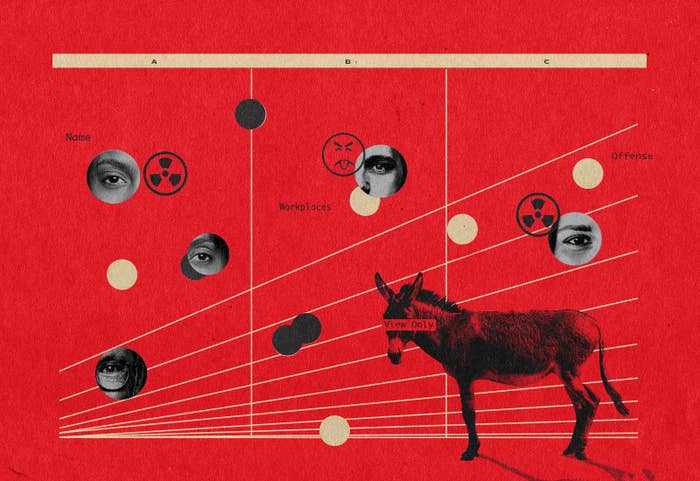
[ad_1]

Mark Harris for BuzzFeed News
Around 3 p.m. on Oct. 15, three weeks before the election, Maya Cantrell opened a blank Google spreadsheet on her laptop and named it “Toxic White ‘Progressives.’” She formatted the document as a basic table and in bold lettering added three column headers to the top of the page: a) “Name,” b) “Workplace(s),” c) “What they did (use next column for multiple offenses).” To do this, she logged out of her Gmail account and signed up for a new one, incognito — display name: Toxic Wypipo — with no identifiable link to her personal account, her work as a Democratic operative, or her location in New York City.
When I asked her later if she wanted to talk about what happened over the 24 hours that followed, Cantrell answered my question quickly. She was eager to talk about the list — not the names and stories, which were highly personal and not intended for public consumption, she said, but the speed with which she watched the whole thing warp from a safe and collaborative space, a resource for a small trusted group, into something else, spiraling Ouroborus-style to its death via the problems that had necessitated the document in the first place. “We couldn’t even have a day to talk about racism in the places we work before our white colleagues consumed it as group-chat gossip,” she said. “It would be nice if something came of this.”
“I am 100% comfortable being on the record,” she told me. “Notoriously, this is something I would do.”
By “this,” she did not mean speaking to a reporter. Cantrell, a 30-year-old Black woman who works in Democratic politics at a software company, has never been quoted in a story, though she does maintain an active online footprint, writing about skincare and makeup on Instagram, where she photographs beautiful jars of moisturizer and body scrub and close-up tufts of velvety cream, and on Twitter, where she has a small cult following and tweets under the name “peloton daughter,” a bit where her dad is always making appointments with his Peloton bike, “peddling away… not a care in the world… offline..not posting.., meanwhile i am on here..,. On the app.” And on the app, where she briefly went by her name until changing it back because anything other than “peloton daughter” felt wrong, Cantrell flits from personal topics (dating, astrology, TikTok) to politics, speaking to you from the cool remove of a voice that is dryly funny, lowercase only, caught somewhere between smartly observed humor and damning commentary. If the late aughts reared a generation of political operatives who were reticent to breathe a bad word against the party if it wasn’t off the record or “on background,” Cantrell is part of a younger generation of staffers who aren’t afraid to get a little spicy on Twitter and just say what needs to be said.
So, “notoriously,” she explained, this is something she would do: find a way to address a problem, the issue of racism and toxicity in Democratic politics, that she and many of her friends and coworkers felt daily but didn’t have the space, at least not collectively, to talk about safely.
That day, a Thursday just a few weeks before the election, the issue was on her mind perhaps more than usual because of problems a friend was having on a campaign. Two of the women she worked with were “not even subtly microaggressive racist, but full-on mean toward Black women.” It was, she said, a very clear pattern. The friend had tried raising it, but no one in a position of power seemed willing to even have the conversation, let alone act. “I was like, This shit is never gonna change. These two girls will get senior-level jobs in the administration or on some other campaign or at a firm and will just continue this pattern forever, because there are never any consequences.”
“They all continue to get jobs. A lot of us have to keep working for them. There’s always someone willing to hire them.”
In politics, this is true more often than not. The culture, with the long hours, the bad power dynamics, the fear of being blackballed, is one that strongly incentivizes silence and inaction. When a campaign does hand down consequences for such behavior, it is usually quietly, because the alternative might hurt the candidate or the cause. The staffer is allowed to resign with dignity and move on to another job, sometimes with a promotion, where new coworkers may be subject to the same problematic behavior. That morning, she sent a tweet: “as we know,” she wrote to her followers, “i have a lot of beef with ‘progressive’ workplaces but my biggest beef of all is that no one gets fired until it’s way way way way too late (or ever tbh). the damage has been done! it was done a long time ago and yet the[y] keep moving up to do… more damage!!! STOP IT.”
“They all continue to get jobs,” Cantrell said. “A lot of us have to keep working for them. There’s always someone willing to hire them. There’s always a redemption arc. There are a lot of repeat offenders who were on that list also. The column for stories went on and on and on. They go from place to place. What happened doesn’t get reported. Maybe they get fired from one place — then they get a new job and everything’s fine.”
Cantrell has worked across the party, for and with a number of candidates, state parties, and committees in the “digital space,” which makes up a large and particularly online pocket of the party. In 2016, she left her job at a small education tech startup to join Hillary Clinton’s campaign. She was an organizer in New Hampshire in the primary, and in the general election she ran the digital organizing program in North Carolina. She has since stayed in digital politics, including at the party’s central arm in Washington, the Democratic National Committee, where she served as the mobilization director for southern states, serving candidates like Andrew Gillum in Florida and Sen. Doug Jones in Alabama.
“I can’t really think of anyone in Democratic politics who has actually been completely ostracized from this world,” she told me over the phone.
I also couldn’t really think of an example. There were a few high-profile cases of firings from campaigns or firms with claims of toxic or racist work environments, but these were still limited compared to the regular, daily problems described by Cantrell and many other women and people of color.
So the list started there, with a burner email and an empty spreadsheet, set up from Cantrell’s apartment in New York after discussing the idea with a group of friends, all of whom were people of color who worked in Democratic politics. “Maybe we could just warn each other at a minimum, then at least when you get hired at these places, whether or not something has been done about it, we know,” she said. “It was a resource for us.”
For the rest of the workday, the list sat empty in an open tab. Around 7 or 8 p.m., she shared the link with her friends. In the doc, everyone’s keystrokes rendered anonymously, with the settings adjusted such that Google automatically replaced every username with that of a randomly assigned animal, each in a different shade of pastel. Across the document, working in different columns and rows, anonymous wombats and owls and moose typed out the traumatic things that happened to them at work: people who were openly hostile to staffers of color, managers who protected people who were openly hostile to staffers of color, managers who favored white people, toxicity that infected office culture both broadly and in deeply specific ways, ranging from habitual yelling to sexual harassment.
These were the same privacy settings that had been in place on the “Shitty Men in Media” doc, another anonymous spreadsheet that circulated in the fall of 2017 at the dawn of the #MeToo movement, containing allegations about dozens of men who worked in journalism and publishing. Like this list, which follows months of protests over police violence against Black people, that one spun out of a broader nationwide reckoning. Like this list, that one was created as a private resource, not an authoritative document meant for the eyes of the public, according to Moira Donegan, a writer who in January 2018 told the story of creating the list in New York magazine after she said a writer from Harper’s threatened to out her as the creator of the doc. Like this list, that one contained unsubstantiated allegations that varied in degrees of severity, a forum whose fairness and responsibility occupied a clearly gray ethical space. And like this list, it very quickly spun out of the creator’s control — a conclusion that now seems inevitable, but which Cantrell says she did not anticipate.
“I don’t think we had concerns. There is a close-knit group and established level of trust with other Black people. There was never any concern that it was going to end up where it shouldn’t have. We still don’t know who was the one person of color who gave it to someone they shouldn’t have.”
It was as if a small bomb had gone off, silently and widely, hitting the anonymous online ecosystems that shape so much of the way information travels in politics and color the tone and feel of campaign culture. In the span of less than 24 hours, the people of color who had participated in the list had felt exposed and seen their private space co-opted by colleagues they knew. Some of the white people who were on the list, which grew to about 35 people and ranged from prominent operatives to lesser-known names across the Democratic Party, had been upset and alarmed, named without given the chance to respond. And some of the white people who were not on the list had gleefully inhaled it as gossip before considering the reasons for the document or the substance of the stories within.
The headline on the story that first revealed the existence of Donegan’s spreadsheet had asked readers, “What to Do With ‘Shitty Media Men’”? The list had circulated widely, unlike Cantrell’s, setting off weeks of think pieces and eventually a lawsuit, but news outlets also opened their own HR inquiries after seeing the spreadsheet and reckoned with what it means for men to hold power in media and publishing. The question of what to do with “toxic white ‘progressives’” is its own particularly thorny question, like something people don’t quite know how to pick up and hold in the light.
When Cantrell closed her computer that first night, about 15 people had a link to the doc.
The next morning, Oct. 16, Cantrell could see the list was picking up steam: She saw about 25 anonymous users in the doc — people she figured were friends of her group, which was part of the initial plan. “It was like, ‘Share this outside, but be careful and mindful of where you’re sharing it.’ It was never a ton of people.” A few cursors were dancing across the screen, actively adding new text. I guess that’s OK, Cantrell thought.
Around 11 a.m., something turned. Suddenly there were 50 to 60 people in the doc, which was not good. Minutes later, she got a text from a white friend about the list, the first of several she would get that day. “Howww did this make its way to you,” Cantrell wrote back to the woman. “its gossip,” the friend responded via iMessage. “it all makes its way to me.” The next text she got was from a white man: “Did you start this lol,” he asked Cantrell, including a screenshot of his discussion of the list with another friend who had sent him the link moments earlier.
“When people started finding out that it was being shared elsewhere, it was like… ‘How did you get a hold of this?’” Cantrell said. In the case of her white male friend, “the chain was so baffling to me. He wouldn’t tell me where he found it. And that was another thing — a lot of people we asked wouldn’t say where they had gotten it from. It’s hard to say where it all went wrong. There were names that came up, but then I would be like, ‘OK, but where did they get it from?’”
Mainly, it seemed to be swirling around the digital world, making the rounds. “And that’s not where I wanted it to be at all,” Cantrell said. Her immediate worries were: 1) There were definitely people who were on the list who had seen it. 2) The stories included personal details such that the entry’s author might be easily identified by the entry’s subject. 3) At this point, anyone could edit the list anonymously in bad faith.
By noon, Cantrell decided to shut down public access entirely. To open the doc, people would first have to request permission, which could not be done anonymously. In a span of about three hours, 32 people requested access to viewing permissions. Of those people, a stack of names still sitting in the inbox of her fake Gmail account, Cantrell counted 17 white people.
The nesting doll–style sequence of texts and screenshots about the list seemed to lead back to an anonymous Slack channel belonging to a small group of employees who work at a Democratic consulting firm. These private Slack groups are popular among Democratic operatives, particularly young ones. They functioned largely as unofficial chat rooms — slightly NSFW spaces for gossip, takes, and eyes-emoji-style content, set up outside the walls of the company’s own Slack server. Cantrell wasn’t a member of the channel, but she recognized people who were and understood the group to be small, made up of around 20 or so members, and mostly white. At some point that morning, though she isn’t sure when, someone in the channel dropped the link to the list, and Cantrell believes that this was the point from which it “escaped,” spreading more widely.
Cantrell has a screenshot showing a snippet of the discussion on Slack:
11:53 a.m. User 1: “Wow”
“Tea is piping today.”
11:53 a.m. User 2:
“my friend who sent this to me was like”
“this will not end up well lol”
“just be smart if you’re writing stuff”
“and it should be fine”
11:54 a.m. User 3:
“Im obsessed with this doc”
Around 3 p.m., Cantrell just shut everything down, clearing out the entries, feeling stung.
“The way they talked about it,” Cantrell said, “was just like, ‘Oh this is my fun gossip for the day. This is my entertainment.’ And it absolutely wasn’t. The way my white friends were texting me about it, like, ‘OMG, the tea is so hot today.’ Why would you even say that to me? At the very least, don’t talk about it like fun gossip — look at it seriously and think, ‘Wow, there are deeply problematic people who work in this space, and part of our justice work should be addressing this also.’”
“Is it gossip or did someone I work with go through something very traumatizing? Why not think, I might work with someone who went through experiences like the ones on this list?”
“These are people who work for organizations that claim to be pro-women, pro-Black, pro-whatever. They did their black squares and their social justice graphics and they went to protests. But when it comes to the actual Black people or people of color they work with, there’s this cognitive dissonance. It’s almost like it doesn’t apply to us. They don’t think of something like this as us sharing extremely private and traumatizing stories about the stuff that happens to us at work. It just didn’t occur to them. They think of it as gossip. Is it gossip or did someone I work with go through something very traumatizing? Why not think, I might work with someone who went through experiences like the ones on this list?”
A few days later, Cantrell tweeted about the incident, breaking from her usual voice. “imagine how bad it has to be for me to actually do a serious tweet!!!” she wrote. “as much as humanly possible i try to keep it all jokes and shit on here but what happened on friday ate me up all weekend. hope those of you who know what this is about internalize how much hurt you caused in such a short period of time.”
Word of the list first made its way to me about a week later, via a source who had seen screenshots and showed them to me. When I reached out to a second source about the spreadsheet, she connected me with Cantrell, whom I knew from Twitter, after first gauging her interest. By the time Cantrell and I spoke, the list in its original form had been gone for two months. She understood that by talking about the doc, she said, she risked resurfacing old screenshots, though she hoped that wouldn’t happen. “Ultimately what I want is to have a larger discussion about what went wrong with the spreadsheet, yeah, but also why it went wrong. This is something industry-wide that we need to address.”
Technically, the spreadsheet is still online. Cantrell sent it to me to show how she left things that day. The link, if you click on it, navigates through the silent and indefinite ether of abandoned Google docs, frozen in the moment of its last edit, to what appears at first to be a mostly empty spreadsheet but within moments takes on the more startling appearance of a doc that is not just empty, but has been made empty for a reason.
At the top of the page, there is a solid green button that reads “view only.” You are not allowed to edit the doc, duplicate the doc, or download the doc to your desktop. You are not allowed to even copy and paste something from within the doc. The doc, essentially, is not for you.
Next to the green button, the list’s original title is no longer there.
“If you’re white and you’re looking at this you’ve truly lost the plot,” the new one reads.
The message goes on below, 13 words scattered across three cells:
A1: “by sharing this.”
C1: “you jeopardized the people you pretend to support.”
D1: “fuck off.” ●
[ad_2]
Source link





